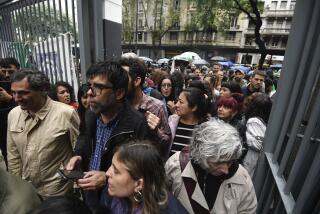10 Million Workers Stage General Strike in Italy : Labor: Four-hour walkout aggravates nation’s greatest economic crisis since World War II.
- Share via
ROME — Almost 10 million workers stalked off their jobs across Italy in a general strike Tuesday, their protest aggravating the nation’s greatest economic and political crisis since World War II.
Presaging a bitter winter, the strike was the street face of multi-sided protests against a besieged government and flagging public institutions. Amid widespread financial distress, there is a national clamor for equitable economic reform. And, as accommodating business leaders follow greedy politicians to jail in dreary procession, there is also a thunderous call for the overhaul of an antiquated political system riddled by corruption.
On Tuesday, workers rallied in downtown piazzas in major cities from Palermo to Padua in a four-hour strike against government austerity measures. Italy’s three major unions called the strike, but union leaders encountered abuse and barrages of missiles from eggs to coins and screws. Violence at a rally of 50,000 workers in central Milan injured three people, police said.
The nationwide strike, which climaxed two weeks of regional protests, closed private and state-run factories, government offices and newspapers. It left big city bus, subway and train services in chaos. Airports remained open, but flights were irregular.
What upsets Italy’s workers most are the slashes in government social services as part of a Draconian 1993 budget, which also calls for sharp tax increases.
Narrowly approved by a divided Parliament in weekend votes-of-confidence, the budget of Prime Minister Giuliano Amato’s government cuts $76 billion from a deficit of more than $120 billion. Pension cuts and reductions in health care by a generous but poorly administered state system won the support of Amato’s four-party majority. But there is deep opposition, including the wave of strikes supported by left-wing opponents.
“The measures are odious and iniquitous,” barked Achille Occhetto, head of Italy’s former Communist Party, still the country’s second-largest party.
After a boom in the 1980s that saw Italy challenge Britain for the world’s fifth-largest gross national product, the Italian economy is now stagnant. The country’s debts are staggering, and its currency, newly devalued, can no longer keep pace with Italy’s European Community partners.
“This is the gravest crisis there has been since 1946-’47 . . . when inflation was sky-high, when the country was destroyed by war. Like then, we will come out of it,” said Amato recently in a doggedly optimistic view of economic prospects.
The slight, unassuming Amato, often caricatured in Italian newspapers as Mickey Mouse, filled a political vacuum after elections last spring that underlined public disgust for mainline parties. His assault on the social system has triggered what Bruno Trentin, the country’s most important labor leader, calls the greatest worker unrest since the tumultuous 1970s.
What alarms Italians is the recognition that besides being financially sick, official Italy is also morally bankrupt. A huge payoff scandal has tarred major political parties and prominent business leaders across Italy. Millions have vanished into private pockets as well as party treasuries.
The scandal exploded earlier this year in Milan, a sophisticated, everything-works metropolis, which prides itself as being the dynamic locomotive of the Italian economic train.
Now, young, tough investigators headed by Milan prosecutor Antonio Di Pietro, one of the most heavily guarded--and admired--men in the country, rake muck that has spread to board rooms and city halls in half a dozen cities. Around Milan, there have been more than 80 arrests of big-name political and business figures--and three suicides--so far.
“As businessmen and as citizens, we must be ashamed of what has happened. I am the first to admit it,” said Cesare Romiti, managing director of Fiat, one of whose companies was among Di Pietro’s earliest victims.
But as ever in Italy, all roads lead to Rome.
“Rome is in the case 100%,” charged Roberto Mongini, a Milan lawyer, businessman and senior member of the Christian Democratic Party who is cooperating with investigators while awaiting trial for accepting illegal payoffs. “Rome knew, did, took and gave--even if they pretend to know nothing.”
More to Read
Sign up for Essential California
The most important California stories and recommendations in your inbox every morning.
You may occasionally receive promotional content from the Los Angeles Times.










